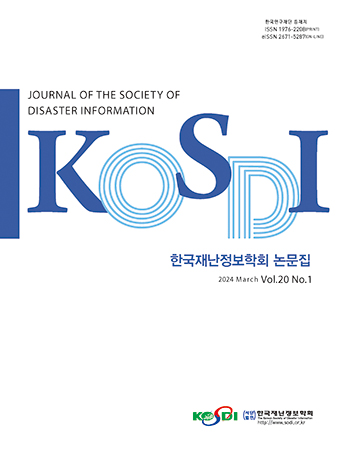Original Article
Abstract
References
Information
Purpose: In this study, the effect of the government's disaster response capabilities and the legal and institutional appropriateness of the disaster management system on the operational performance of disaster management performance were verified. Method: Questionnaire survey was performed for the fire officials, and the surveyed data was statistically analyzed by using SPSS 25.0 program. Result: The main results of this study are as follows. First, the government’s earthquake disaster response capability is found to have a significant effect on disaster follow-up management as well as disaster prevention preparation, which is a factor in disaster management performance. Second, it has been shown that the legal and institutional appropriateness of the earthquake disaster management system has a significant impact on disaster follow-up management as well as disaster prevention preparation, which is a factor of disaster management performance. Conclusion: The important policy implications for improving the operation performance of disaster management could be obtained in preparation for earthquakes in Korea.
연구목적: 본 연구에서는 재난관리의 주체인 소방공무원들을 대상으로 정부의 재난대응역량과 재난관리체계의 법・제도적 적절성이 재난관리 운영성과에 미치는 영향을 검증하였다. 연구방법: 소방공무원을 대상으로 설문조사를 수행하였으며, 조사자료는 SPSS 25.0 프로램을 이용하여 통계적 분석을 수행하였다. 연구결과: 본 연구를 통해 나타난 주요 결과는 다음과 같다. 첫째, 정부의 지진 재난대응역량은 재난관리 운영성과 요인인 재난 사전예방준비 뿐만 아니라, 재난 사후대응관리에도 유의미한 정(+)의 영향을 미치는 것으로 나타났다. 둘째, 지진 재난관리체계의 법・제도적 적절성은 재난관리 운영성과 요인인 재난 사전예방준비 뿐만 아니라, 재난 사후대응관리에도 유의미한 정(+)의 영향을 미치는 것으로 나타났다. 결론: 본 연구를 통해 국내 지진대비 재난관리의 운영성과를 향상시킬 수 있는 중요한 정책적 시사점을 얻을 수 있었다.
- Byun, W.T. (2018). A Study on the Determinants of the Effectiveness of Disaster Prevention-focused on Perception of Residents for Earthquake. Doctor's thesis, Graduate School of Konkuk University.
- Choi, Y.H. (2005). A Study on the Factors Affecting on the Effectiveness of Pre-disaster-management-system of Local Government. Doctor's thesis, Graduate School of Chosun University.
- Jo, S.H., Kim, T.Y. (2014). "The implications of the disposal learning theory to the disaster management policy of Korea." Korean Public Administration Review, Vol. 48, No. 4, pp.407-433.
- Kim, K.R., Yoo, B.W. (2013). Introduction to Disaster Management, Jeonghoon Publication.
- Kim, M.H., Seo, S.W. (2017). "A study on improved disaster management system in defense field." Journal of the Korean Society of Safety, Vol. 32, No. 3, pp. 105-111.
- Ko, I.J. (2015). A Study on Local Government's Establishment of Disaster Management Capacity Assessment System : Focusing on Jeju Special Self-governing Province." Doctor's thesis, Graduate School of Jeju University.10.14251/krcem.2015.11.12.31
- Mushkatel, A.H., Weschler, L.F. (1985). "Emergency management and the intergovernmental system." Public Administration Review, Vol. 45, pp. 123-126.10.2307/3134997
- Quarantelli, E.L. (1988). "Disaster crisis management: A summary of research finding." Journal of Management Studies, Vol. 25, No. 4, pp. 78-89.10.1111/j.1467-6486.1988.tb00043.x
- Yang, K.K., Jeong, W.H., Kang, C.M. (2006). "A Study on the Improvement of Local Government Disaster Management Organization." Proceeding of Korean Governance Association.
- Zimmerman, R. (1985). "The relationship of emergency management to governmental policies on man-made technological disasters." Public Administration Review, Vol. 45, pp. 46-55.10.2307/3134995
- Publisher :The Korean Society of Disaster Information
- Publisher(Ko) :한국재난정보학회
- Journal Title :Journal of the Society of Disaster Information
- Journal Title(Ko) :한국재난정보학회논문집
- Volume : 16
- No :2
- Pages :318-330
- DOI :https://doi.org/10.15683/kosdi.2020.06.30.318




 Journal of the Society of Disaster Information
Journal of the Society of Disaster Information







